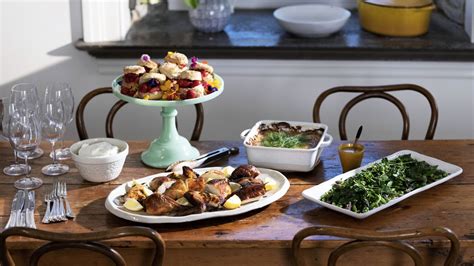
Eleanor Roosevelt’s White House wasn’t just about political strategy and diplomacy; it was also a place where Sunday suppers created a comforting, family-oriented environment amidst the pressures of presidential life. These suppers, more casual than formal state dinners, offered a respite for President Franklin D. Roosevelt, their family, and close friends, emphasizing simple, hearty food and relaxed conversation.
Eleanor Roosevelt’s approach to White House dining was far from extravagant, deliberately contrasting with the opulent norms of previous administrations. These Sunday night meals were designed to be informal and accessible, providing a sense of normalcy for the First Family during a period marked by national and global crises. “Her suppers were legendary for their simplicity,” notes a historical account, highlighting the stark difference between these gatherings and the more elaborate affairs typically associated with the White House. The menu often featured dishes like scrambled eggs, creamed chicken, and simple desserts, reflecting Eleanor’s practical and unpretentious nature.
The tradition of Sunday suppers served a vital purpose: fostering a sense of family and providing a relaxed environment for President Roosevelt. With the weight of the Great Depression and World War II looming, these meals offered a brief escape and an opportunity for informal discussions outside the constraints of official meetings. As described, these suppers were “a time for family and close friends to gather and enjoy a simple meal together,” emphasizing the importance of personal connections amidst the demands of high office.
Eleanor Roosevelt’s choice of food also reflected her commitment to practicality and frugality, especially during times of national hardship. Instead of lavish dishes, she preferred simple, comforting meals that were easy to prepare and affordable. This approach aligned with her broader efforts to connect with ordinary Americans and demonstrate solidarity during challenging times. The focus wasn’t on gourmet cuisine but on providing a nurturing and welcoming atmosphere where guests could feel at ease.
The legacy of Eleanor Roosevelt’s Sunday suppers extends beyond mere culinary history; it embodies her values of simplicity, inclusivity, and connection. These gatherings served as a reminder that even in the highest echelons of power, the simple act of sharing a meal can foster understanding and strengthen relationships. Her approach to White House hospitality remains an example of how food can be used to create a sense of community and offer solace during times of uncertainty.
Diving Deeper into Eleanor’s Sunday Suppers
Eleanor Roosevelt’s Sunday suppers were a conscious choice, diverging sharply from the elaborate dinners often associated with the White House. This decision reflected her personality and her desire to create a more relatable and accessible First Family. While state dinners involved meticulous planning, formal attire, and complex menus, the Sunday suppers were a deliberate attempt to strip away the formality and create a more intimate setting.
The contrast between these suppers and traditional White House dinners was stark. The former focused on ease and comfort, while the latter prioritized protocol and presentation. This difference highlighted Eleanor Roosevelt’s commitment to down-to-earth values and her desire to connect with people on a personal level. By simplifying the dining experience, she created an environment where genuine conversation and connection could flourish.
The choice of food was also significant. Dishes like scrambled eggs and creamed chicken were not only easy to prepare but also familiar and comforting. These meals evoked a sense of home, providing a stark contrast to the often-stilted atmosphere of formal dinners. By serving such simple fare, Eleanor Roosevelt signaled that these gatherings were about people, not pomp.
The guest list for these suppers typically included family members, close friends, and trusted advisors. This created a tight-knit group that could offer President Roosevelt support and companionship outside the pressures of his official duties. The informal setting encouraged open and honest dialogue, allowing for a different kind of interaction than what was possible in more formal settings.
Eleanor Roosevelt’s emphasis on simplicity extended beyond the food and the guest list. The décor was also kept minimal, with the focus on creating a relaxed and welcoming atmosphere. This approach underscored her belief that true connection comes from genuine interaction, not elaborate displays.
These Sunday suppers were more than just meals; they were a reflection of Eleanor Roosevelt’s values and her vision for a more accessible and relatable White House. They served as a reminder that even in positions of great power, the simple act of sharing a meal can foster connection and provide comfort. Her legacy continues to inspire those who seek to create meaningful experiences through food and hospitality.
The Menu: A Study in Simplicity
The culinary choices at Eleanor Roosevelt’s Sunday suppers were deliberately understated, reflecting her pragmatic approach to White House entertaining. Unlike the extravagant meals served at state dinners, these suppers featured simple, comforting dishes that were easy to prepare and universally appealing. The emphasis was not on gourmet cuisine but on creating a relaxed and welcoming atmosphere where guests could feel at ease.
One of the staples of these suppers was scrambled eggs, a dish that is both simple and satisfying. This choice reflected Eleanor Roosevelt’s desire to provide a familiar and comforting meal, one that would evoke a sense of home. Scrambled eggs are also relatively inexpensive and easy to prepare in large quantities, making them a practical choice for informal gatherings.
Creamed chicken was another popular dish, offering a heartier option for those who wanted something more substantial. This dish, typically made with chicken, cream sauce, and vegetables, is another example of a simple and comforting meal that is easy to prepare. Like scrambled eggs, creamed chicken is also relatively inexpensive and can be adapted to suit different tastes and dietary needs.
The desserts served at these suppers were equally simple, often featuring fruit or a basic cake. These desserts were not elaborate creations but rather straightforward and satisfying treats that complemented the rest of the meal. The focus was on providing a sweet ending to the meal without overwhelming the palate or requiring extensive preparation.
Eleanor Roosevelt’s culinary choices were also influenced by the economic realities of the time. During the Great Depression, many Americans struggled to afford basic necessities, and the First Lady was acutely aware of this hardship. By serving simple and affordable meals, she demonstrated solidarity with ordinary Americans and signaled that the White House was not out of touch with their struggles.
The simplicity of the menu also allowed Eleanor Roosevelt to focus on other aspects of the supper, such as the conversation and the atmosphere. By not having to worry about elaborate food preparation, she could devote her attention to ensuring that her guests felt comfortable and engaged.
In many ways, the menu at Eleanor Roosevelt’s Sunday suppers was a reflection of her personality and her values. It was practical, unpretentious, and focused on providing a nurturing and welcoming environment. These meals were not about showcasing culinary skill but about fostering connection and creating a sense of community.
The Atmosphere: Fostering Connection and Relaxation
The atmosphere at Eleanor Roosevelt’s Sunday suppers was as carefully cultivated as the menu, with a deliberate focus on creating a relaxed and informal environment. These gatherings were designed to provide a respite from the pressures of political life, offering a space where President Roosevelt and his guests could unwind and connect on a personal level.
One of the key elements of the atmosphere was the absence of formality. Unlike state dinners, which were governed by strict protocols and elaborate rituals, the Sunday suppers were deliberately casual. Guests were encouraged to dress comfortably and to engage in relaxed conversation. This informality helped to put people at ease and to foster a sense of camaraderie.
The seating arrangements were also designed to promote interaction. Instead of formal place settings, guests were often seated at smaller tables, which encouraged conversation and allowed for more intimate interactions. This arrangement also helped to break down barriers and to create a more egalitarian atmosphere.
Eleanor Roosevelt played a key role in shaping the atmosphere of these suppers. She was known for her warmth and her ability to make people feel comfortable. She made a point of engaging with each guest, asking about their lives and interests, and creating a sense of connection. Her genuine interest in others helped to foster a welcoming and inclusive environment.
The conversation at these suppers was also carefully managed. Eleanor Roosevelt encouraged open and honest dialogue, but she also steered the conversation away from contentious topics. She wanted these gatherings to be a space for relaxation and connection, not for political debates.
The atmosphere of these suppers was also influenced by the physical setting. The White House was a grand and imposing building, but Eleanor Roosevelt worked to create a more intimate and welcoming space for these gatherings. She used softer lighting, comfortable furniture, and personal touches to make the room feel more like a home than a government building.
In many ways, the atmosphere at Eleanor Roosevelt’s Sunday suppers was a reflection of her values and her vision for a more accessible and relatable White House. She believed that true connection comes from genuine interaction, not from elaborate displays or formal protocols. By creating a relaxed and informal environment, she fostered a sense of community and provided a much-needed respite for President Roosevelt and his guests.
The Guests: A Circle of Family, Friends, and Advisors
The guest list for Eleanor Roosevelt’s Sunday suppers was carefully curated to include a mix of family members, close friends, and trusted advisors. These gatherings were designed to provide President Roosevelt with a support system outside the pressures of his official duties, offering a space where he could relax, connect, and engage in informal conversation.
Family members were a constant presence at these suppers, including Eleanor Roosevelt’s children and grandchildren. These gatherings provided an opportunity for the First Family to spend quality time together, strengthening their bonds and creating a sense of normalcy amidst the demands of presidential life.
Close friends were also frequent guests, offering companionship and support to both President and Mrs. Roosevelt. These friends often came from outside the political sphere, providing a valuable perspective and a welcome distraction from the pressures of government.
Trusted advisors were also included on the guest list, offering President Roosevelt an opportunity to engage in informal discussions about policy and strategy. These advisors often brought a different perspective than those who worked directly in the White House, providing valuable insights and helping to shape the President’s thinking.
The guest list was also notable for its diversity. Eleanor Roosevelt was committed to inclusivity and made a point of inviting guests from different backgrounds and perspectives. This diversity helped to broaden the conversation and to expose President Roosevelt to a wider range of viewpoints.
The selection of guests was also influenced by Eleanor Roosevelt’s desire to create a relaxed and informal atmosphere. She avoided inviting people who were likely to dominate the conversation or to create tension. Instead, she focused on inviting guests who were known for their warmth, their sense of humor, and their ability to connect with others.
The guest list for Eleanor Roosevelt’s Sunday suppers was not static; it evolved over time to reflect the changing circumstances of the Roosevelt administration. As new challenges arose, she would invite experts and advisors who could provide valuable insights and support.
In many ways, the guest list for these suppers was a reflection of Eleanor Roosevelt’s values and her vision for a more inclusive and collaborative White House. She believed that true leadership comes from listening to a wide range of voices and from fostering a sense of community. By inviting a diverse group of guests to her Sunday suppers, she helped to create an environment where President Roosevelt could connect with others, gain valuable insights, and strengthen his resolve.
Historical Context: The Great Depression and World War II
Eleanor Roosevelt’s Sunday suppers took place during a period of unprecedented national and global turmoil, encompassing the Great Depression and World War II. These events profoundly shaped the atmosphere and purpose of these gatherings, influencing the menu, the guest list, and the overall tone.
The Great Depression, which began in 1929, had a devastating impact on the American economy and society. Millions of people lost their jobs, their homes, and their savings. Eleanor Roosevelt was deeply affected by the suffering she witnessed, and she dedicated herself to helping those in need.
The economic hardship of the Depression influenced the menu at her Sunday suppers. She deliberately chose simple and affordable dishes, demonstrating solidarity with ordinary Americans who were struggling to make ends meet. Her choices reflected a commitment to frugality and a desire to avoid any appearance of extravagance.
World War II, which began in 1939, brought even greater challenges to the United States. The war demanded immense sacrifices from the American people, both at home and abroad. Eleanor Roosevelt played an active role in supporting the war effort, visiting troops, advocating for women in the workforce, and promoting national unity.
The war also influenced the atmosphere of her Sunday suppers. These gatherings became a space for President Roosevelt and his advisors to discuss war strategy and to grapple with the challenges of leading the nation through a global conflict. The suppers also provided a much-needed respite from the pressures of war, offering a chance for relaxation and connection.
The historical context of the Great Depression and World War II underscores the significance of Eleanor Roosevelt’s Sunday suppers. These gatherings were not simply social events; they were an integral part of the Roosevelt administration’s response to the challenges of the time. They provided a space for connection, for support, and for strategic thinking, helping to shape the course of American history.
Eleanor’s Legacy: Impact on White House Hospitality
Eleanor Roosevelt’s approach to hospitality significantly altered the traditions of the White House, emphasizing simplicity, accessibility, and a genuine connection with the American people. Her Sunday suppers, while seemingly modest, left an enduring legacy that continues to influence how First Families approach their role as hosts.
Prior to Eleanor Roosevelt, White House entertaining often leaned towards formality and grandeur, reflecting the status and power of the presidency. She consciously shifted away from this model, creating a more relaxed and inclusive atmosphere. This change reflected her personal values and her belief that the White House should be a place where ordinary Americans could feel a sense of connection.
Her emphasis on simple, comforting food was a stark departure from the elaborate menus of previous administrations. This choice not only aligned with the economic realities of the Great Depression and World War II but also signaled a shift in priorities. Eleanor Roosevelt demonstrated that hospitality was not about extravagance but about creating a welcoming and nurturing environment.
The informal nature of her Sunday suppers also had a lasting impact. By eschewing strict protocols and encouraging relaxed conversation, she fostered a sense of camaraderie and connection. This approach helped to break down barriers and to create a more egalitarian atmosphere within the White House.
Eleanor Roosevelt’s legacy extends beyond specific events; it’s about her broader philosophy of hospitality. She believed that the White House should be a place where people from all walks of life could feel welcome and valued. Her commitment to inclusivity and her genuine interest in others helped to shape a new model of White House entertaining, one that is more focused on connection and community.
Later First Ladies have drawn inspiration from Eleanor Roosevelt’s example, adapting her principles to their own styles and priorities. Many have sought to create a more accessible White House, hosting events that showcase American culture and celebrating the diversity of the nation.
Her legacy serves as a reminder that hospitality is not simply about serving food and drink; it’s about creating an environment where people can connect, communicate, and feel valued. Her approach to White House entertaining remains an example of how leadership can be expressed through simple acts of kindness and connection.
Frequently Asked Questions (FAQ)
-
What was the purpose of Eleanor Roosevelt’s Sunday suppers?
- The primary purpose was to create a relaxed and informal environment for President Roosevelt, their family, and close friends to connect and unwind amidst the pressures of presidential life. These suppers offered a respite from formal state dinners and provided an opportunity for informal discussions and strengthening personal bonds. As noted in the original article, it was “a time for family and close friends to gather and enjoy a simple meal together.”
-
What kind of food was typically served at these Sunday suppers?
- The menu typically featured simple, comforting dishes like scrambled eggs, creamed chicken, and basic desserts. Eleanor Roosevelt intentionally avoided extravagant meals, opting for affordable and easy-to-prepare options that reflected her practical nature and the economic realities of the time. The emphasis was on creating a nurturing atmosphere rather than gourmet cuisine.
-
Who was usually invited to Eleanor Roosevelt’s Sunday suppers?
- The guest list included family members, close friends, and trusted advisors. This intimate group provided President Roosevelt with a support system outside the official demands of his office. The composition of the guest list aimed to foster open and honest dialogue and offer a diverse range of perspectives.
-
How did Eleanor Roosevelt’s Sunday suppers differ from traditional White House dinners?
- Unlike formal state dinners, which involved meticulous planning and strict protocols, Eleanor Roosevelt’s Sunday suppers were deliberately casual and informal. The emphasis was on creating a relaxed environment where guests could feel at ease, fostering genuine conversation and connection rather than adhering to rigid etiquette.
-
What impact did the Great Depression and World War II have on Eleanor Roosevelt’s approach to White House hospitality?
- The Great Depression and World War II significantly influenced her approach, leading her to prioritize frugality and simplicity. She chose affordable dishes to demonstrate solidarity with struggling Americans and create a sense of shared sacrifice. These events underscored the importance of providing comfort and connection during times of national hardship.
-
Why did Eleanor Roosevelt choose to serve such simple meals during her Sunday suppers?
- Eleanor Roosevelt’s choice of simple meals was driven by several factors. Firstly, she wanted to create a relaxed and unpretentious atmosphere, where guests felt comfortable and at ease. Secondly, she was mindful of the economic hardships faced by many Americans during the Great Depression and wanted to avoid appearing extravagant or out of touch. Thirdly, she believed that simple meals allowed for more focus on conversation and connection, which were the primary goals of her Sunday suppers.
-
How did Eleanor Roosevelt’s Sunday suppers reflect her personal values?
- Eleanor Roosevelt’s Sunday suppers were a direct reflection of her personal values, including simplicity, inclusivity, and connection. She believed in creating a welcoming and nurturing environment for her guests, regardless of their social status or background. Her choice of simple meals and informal atmosphere demonstrated her commitment to practicality and her desire to connect with people on a personal level.
-
What role did President Franklin D. Roosevelt play in the Sunday supper tradition?
- President Franklin D. Roosevelt greatly appreciated the Sunday supper tradition as a means of escaping the pressures of his office and spending quality time with his family and close friends. While Eleanor Roosevelt was the primary organizer and hostess, President Roosevelt actively participated in the conversations and enjoyed the relaxed atmosphere. The suppers provided him with a much-needed opportunity to unwind and recharge.
-
How did Eleanor Roosevelt’s Sunday suppers contribute to the image of the Roosevelt administration?
- Eleanor Roosevelt’s Sunday suppers helped to create a more relatable and accessible image for the Roosevelt administration. By emphasizing simplicity and connection, she demonstrated that the First Family was not out of touch with the struggles of ordinary Americans. The suppers also reinforced the idea that the White House was a place for all Americans, not just the elite.
-
Are there any documented recipes or accounts of specific meals served at Eleanor Roosevelt’s Sunday suppers?
- While detailed recipes are scarce, historical accounts mention dishes like scrambled eggs, creamed chicken, and simple desserts as common features of Eleanor Roosevelt’s Sunday suppers. These meals were not documented in the same way as formal state dinners, as the focus was on simplicity and informality rather than elaborate culinary creations.
Extending the Context: Broader Impact and Modern Relevance
Eleanor Roosevelt’s emphasis on inclusivity and accessibility resonated deeply with the American public, particularly during the challenging times of the Great Depression and World War II. Her approach to White House hospitality reflected her genuine concern for the well-being of all Americans and her commitment to creating a more equitable society. She used her position as First Lady to advocate for social justice, civil rights, and economic opportunity, and her Sunday suppers were just one example of how she sought to bridge the gap between the White House and the American people.
Her legacy extends beyond the realm of politics and hospitality, influencing how we think about leadership, community, and social responsibility. She demonstrated that true leadership is not about power or privilege but about empathy, compassion, and a willingness to serve others. Her commitment to creating a welcoming and inclusive environment, both in the White House and in her personal life, serves as an inspiration for those who seek to build a more just and equitable world.
In today’s world, where social divisions and political polarization are on the rise, Eleanor Roosevelt’s example is more relevant than ever. Her emphasis on connection, communication, and understanding offers a roadmap for building bridges across differences and fostering a sense of shared humanity. Her Sunday suppers, while simple in their execution, embody a powerful message of inclusivity and community that can help us navigate the challenges of our time.
Her legacy also challenges us to reconsider our own approaches to hospitality and community building. Are we creating environments where everyone feels welcome and valued? Are we prioritizing connection and communication over extravagance and formality? Are we using our resources and influence to promote social justice and economic opportunity?
Eleanor Roosevelt’s Sunday suppers were more than just meals; they were a reflection of her values and her vision for a better world. By embracing simplicity, inclusivity, and connection, she created a lasting legacy that continues to inspire and challenge us today. Her example reminds us that even the simplest acts of kindness and connection can have a profound impact on the lives of others and on the course of history.









